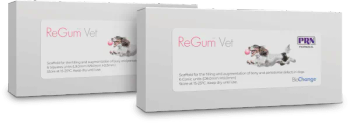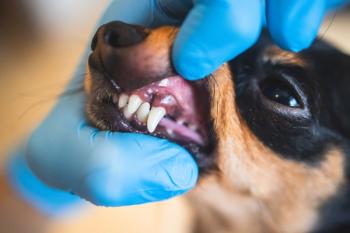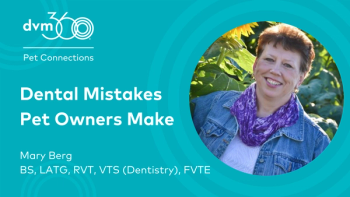
6 stinky dental recommendations
Bad words matter. And you could be turning off veterinary clients with these weak words and phrases. Use these sample scripts for a fresh approach to dental care.
At a recent CVC, Karen Felsted, CPA, MS, DVM, CVPM, and Barden Greenfield, DVM, DAVDC, warned against serving up lame, lukewarm dental and wellness recommendations. Let's take a look at some real stinkers and examples of stronger recommendations.
Don't say: "Looking at Fiona's teeth, it wouldn't hurt to consider a dental in the near future."
Why it sucks: It's weak. You don't sound sure, so why would the client ever say yes?
A better approach: "Linus has plaque on his teeth and he's suffering from gingivitis. We grade this as stage 2 dental disease. He needs a cleaning and a full evaluation of his oral health under general anesthesia. I'm going to bring Pam in to discuss Linus' treatment plan and take a look at my book to see when I can do this procedure for him."
Don't say: "You might want to think about doing the x-rays too."
Also don't say: "I know it's expensive, but x-rays might help us see what's going on better."
Why it sucks: There's no recommendation here. You're leaving it up to the client to make a decision about whether radiographs are diagnostically important.
A better approach: "Mrs. Smith, do you have any questions about the dental care Roxy needs? It's so much better to do this now while this oral infection is low and she's experiencing only minor oral discomfort. We'll be able to do a full radiographic evaluation while she's under general anesthesia to look below the gum line, where oral disease can be very problematic."
Don't say: "Here's a brochure about dental radiographs. You can look at it when you get home."
Why it sucks: While handouts are great, this delivery isn't. This makes it sound like you couldn't care less whether this handout ends up in the clients' circular file. And if you use this language, it's gonna end up straight in the trash-without being read.
A better approach: "Check your email when you get home for a short educational handout that we made to teach you more about the benefits of regular dental cleanings and how to get Maximus prepared for his day at the dentist."
Then
Don't say: "You might want to think about this new wellness program …"
Also don't say this: "You probably don't want another credit card, but here's some information on this vet one."
Why it sucks: The first approach is wishy-washy, and the second one leads the client to only one possible conclusion: You don't believe in the recommendation you're offering.
What to say instead: "It's obvious that you're committed to Ringo's welfare, which is why I'd like to talk to you about the payment plans we accept and offer. We know that unexpected expenses can sometimes make it harder to offer the care your pets need. That's why we want to discuss ways to pet care more affordable in emergency and everyday situations." (Then present your practice's payment options, including wellness plans, pet insurance recommendations and third-party payment options.)
Bonus tip from Mary Berg, BS, RVT, RLATG, VTS (dentistry): Use "infection" instead of "periodontal disease." It's easier for clients to understand, and it carries more urgency.
Newsletter
From exam room tips to practice management insights, get trusted veterinary news delivered straight to your inbox—subscribe to dvm360.






